Electoral Bonds Unbonded (Legitimate or root of corruption)
Context:
A five-judge Constitution Bench of the Supreme Court on 15th February, unanimously struck down the Centre’s electoral bond scheme for being unconstitutional. It underscored that the scheme violates the right to information under Article 19(1)(a) of the Constitution.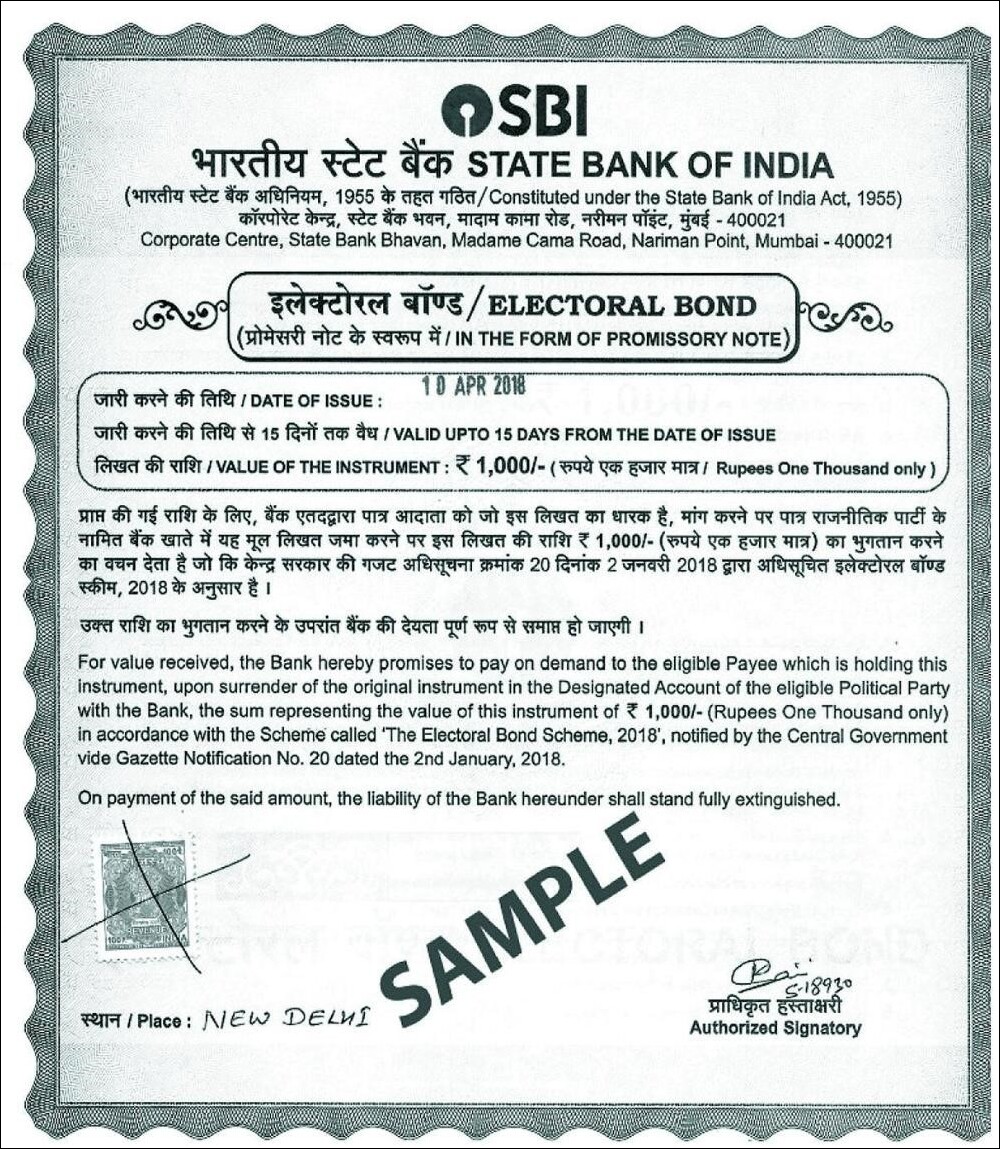
What are Electoral Bonds?
Electoral bonds are a form of financial instrument introduced by the Government of India, aimed at streamlining donations to political parties. They are essentially bearer instruments, similar to promissory notes, which can be purchased by any individual, company, or organization that is a citizen of India or incorporated or established in India.
-
About:
- The electoral bonds system was introduced in 2017 by way of a Finance bill and it was implemented in 2018.
- They serve as a means for individuals and entities to make donations to registered political parties while maintaining donor anonymity.
- SBI is the authorized issuer of electoral Bonds and they are issued through 29 designated SBI branches.
- The total value of Electoral Bonds purchased (2018- 2024) is about ₹16,518 crores.
-
Features:
- State Bank of India (SBI) issues the bonds in denominations of Rs 1,000, Rs 10,000, Rs 1 lakh, Rs 10 lakh, and Rs 1 crore.
- Payable to the bearer on demand and interest-free.
- Purchased by Indian citizens or entities established in India.
- Can be bought individually or jointly with other individuals but not more than 3 applicants per application form.
- Valid for 15 calendar days from the date of issue.
-
Eligibility of Political Parties:
- Only the political parties registered under Section 29A of the Representation of the People Act, 1951 and have secured not less than 1% of the votes polled in the last general election to the Lok Sabha (House of the People) or the State Legislative Assemblies, are eligible to receive electoral bonds.
-
Purchase and Encashment:
- Electoral Bonds can be purchased through Cheque, DD, SBI INB, NEFT/RTGS or Direct Debit to the Applicant Account but No Cash.
- Encashment only through an authorized bank account of the political party.
-
Benefits:
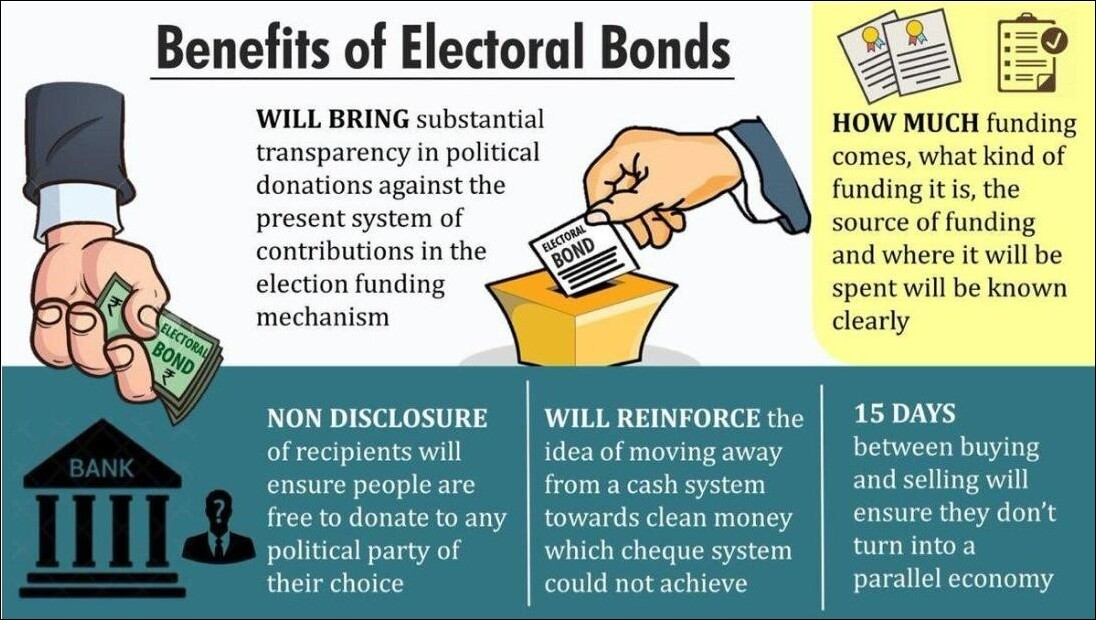
The Genesis of Electoral Bonds:
On 14 May 2016, the Finance Act, 2016 came into force. It amended Section 2(1)(j)(vi) of the Foreign Contribution Regulation Act, 2010 (FCRA), which defines “foreign source”, to allow foreign companies who have a majority share in Indian companies to donate to political parties. Previously, foreign companies were prohibited from donating to political parties under the FCRA and the Foreign Exchange Management Act, 1999. The journey of electoral bonds began with their introduction in the Finance Bill of 2017, coming into effect with the scheme being notified on January 29, 2018, as shown below:| Various Acts relating Electoral Bonds ‘before’ the amendment. | Amendments made through Finance Act 2017. | Supreme court’s judgment. |
|---|---|---|
The Companies Act, 2013.
|
|
|
The Income-tax Act, 1961
|
|
|
The Representation of the People Act, 1951
|
|
|
Section 31 of RBI Act,1934
|
|
Timeline of the legal challenge against the Electoral Bonds Scheme (EBS) in India:
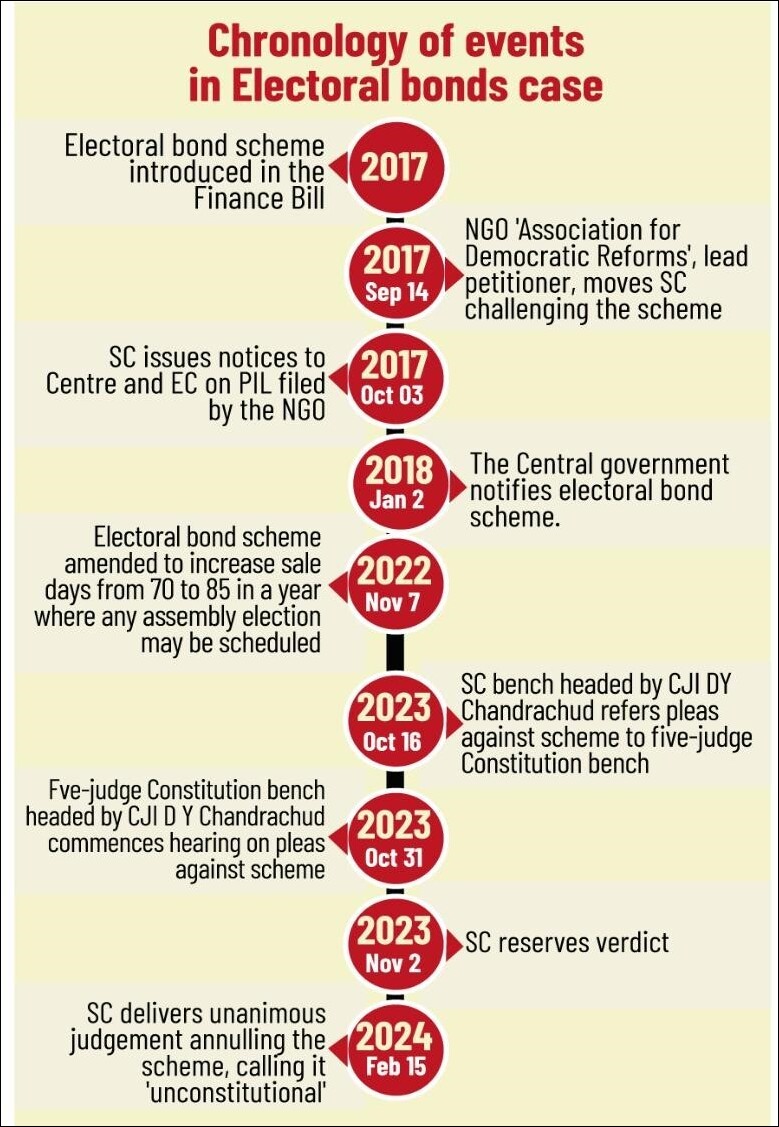
- The intilal red flags were raised by poll panel by Election commission, in 2017 when Naseem Zaidi was chief election commissioner, of India as:-
- ECI proposed a new Section 29C to be inserted in the Representation of the People Act to ensure full disclosure of amounts received by a political party and the expenditure incurred, it will further increase opacity in the electoral process.
- Government in court claimed that the amendments in the respective legislations have been made and the electoral bond scheme has been introduced as a pioneer step in bringing electoral reforms to ensure that the spirit of transparency and accountability in political funding is maintained".
- The counter affidavit filed by the Department of Economic Affairs of the finance ministry stated that the "electoral bonds were a positive step in the right direction to ensure accountability and transparency in conducting elections".
Further developments:
- 25 March, 2019: The Election Commission of India (ECI) filed an affidavit in the Supreme Court opposing the Electoral Bond Scheme, citing concerns over transparency and potential foreign influence in political funding.
- 1 April, 2019: The Union Government submitted a rejoinder defending the EBS as a pioneering step in electoral reforms aimed at enhancing transparency and accountability in political funding, emphasizing the role of the State Bank of India (SBI) and the requirement for KYC details to ensure accountability.
- 12 April, 2019: The Supreme Court, led by Chief Justice Ranjan Gogoi, along with Justices Deepak Gupta and Sanjiv Khanna, directed political parties to submit details of donations received through electoral bonds in a sealed cover to the ECI. The Court did not stay the scheme but noted the need for an in-depth hearing on the matter.
- November, 2019 & October, 2020: Petitioners sought urgent hearings on the matter, particularly before the Bihar elections in 2020.
- Early 2021: The Association for Democratic Reforms (ADR) sought a stay on the EBS before new bond sales. A Bench led by Chief Justice S.A. Bobde, with Justices A.S. Bopanna and V. Ramasubramanian, declined the stay, dismissing apprehensions about foreign influence as misconceived.
- 16 October, 2023: Petitioners approached the Supreme Court for an expedited hearing before the 2024 General Elections. The case was referred to a five-judge Constitution Bench by a Bench led by Chief Justice D.Y. Chandrachud, noting the importance of the issue.
- 31 October, 2023: The Constitution Bench, led by CJI Chandrachud and comprising Justices Sanjiv Khanna, B.R. Gavai, J.B. Pardiwala, and Manoj Misra, heard arguments over three days. The petitioners argued against the scheme, citing increased corporate funding and potential for corruption, while the Union defended the scheme’s confidentiality measures as protective of donor privacy
- 2nd November, 2023: the Constitution Bench reserved judgment.
- Eventually, on 15th February, 2024 the Electoral Bond scheme was struck down.
Issues highlighted by senior advocates including Prashant Bhushan, Nizam Pasha, Kapil Sibal, Vijay Hansaria, Sanjay Hegde and Advocate Shadan Farasat with respect to Electoral Bonds:
Violates Right to Information:
Violates the citizen's fundamental right to information under Article 19 (1)(a) which guarantees all citizens the right to “freedom of speech and expression”.
Enables backdoor lobbying and quid pro quo:
There is circumstantial evidence to prove that there were kickbacks being paid by corporations via electoral bonds to political parties in power to get favors for the corporations.
For Instance, Donations of Electoral Bonds from Vedanta Limited, a company that has been declared as the preferred bidder for various mining licenses, went up despite reports of a financial crunch. In the last five years, the company has donated Rs 457 crore to political parties through these bonds, according to a report in The Economic Times (ET).
Opens doors to shell companies:
It has been argued that since the government removed the limit of 7.5 percent of the annual profit for companies to make donations to political parties and allowed Indian subsidiaries of foreign companies to make donations.
Opaque instrument that is not entirely anonymous:
As, nobody can come to know other than the government who contributed to whom. Since the SBI comes under the government, donations to the opposition can come under scrutiny by an investigative agency, which leads to selective anonymity
Can be used for any other purpose than Elections:
The name "Electoral Bond" is a misnomer as the money can be used for any purpose after it is withdrawn since no one is asking how the parties spent the money.
Promotes corruption:
The account can be closed anytime by the political party. This scheme might protect criminals from being prosecuted under the Prevention of Corruption Act (PCA) and Prevention of Money Laundering Act (PMLA).
Eliminates level playing field for political parties in Opposition:
"More than 50 per cent have been received only by the ruling party at the Centre and the rest have only been received by the respective ruling party in States and the opposition parties received very less amount.
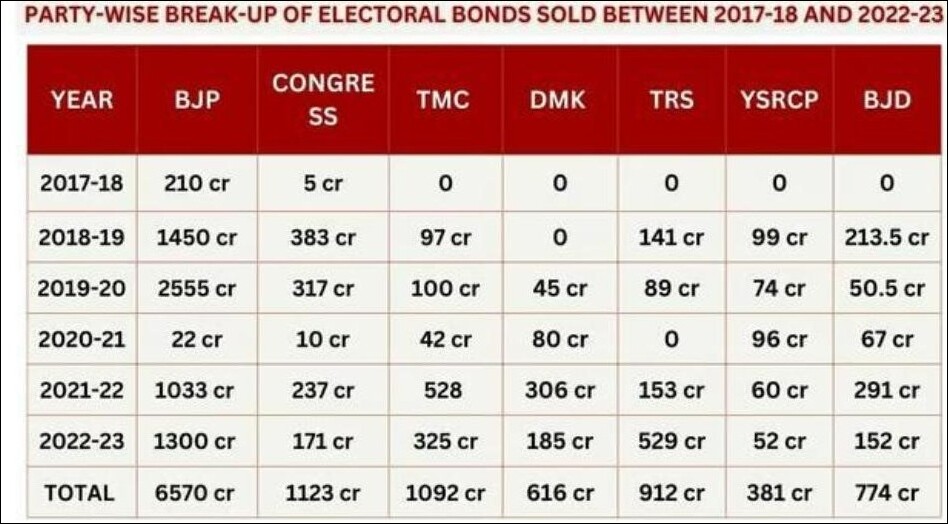
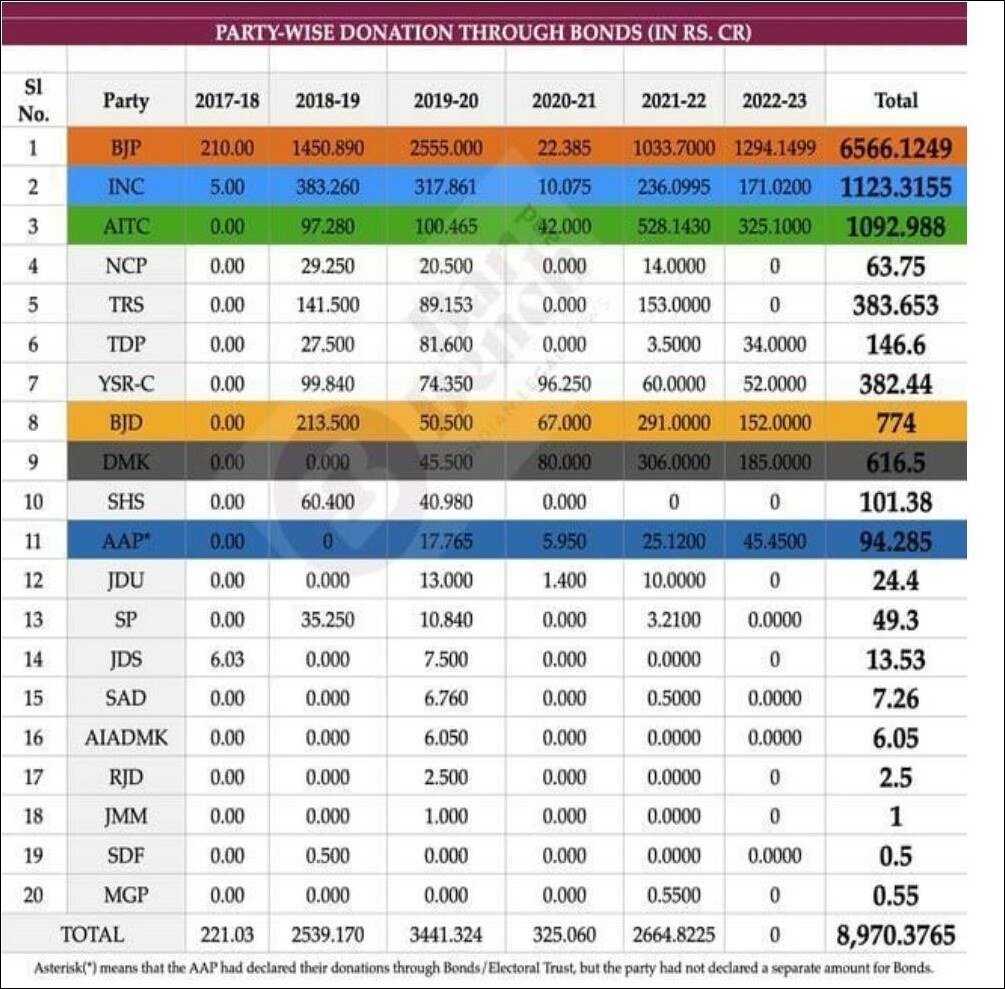
Unfair to the shareholder investing in Companies:
Shareholders in a company put in their money to ensure that the corporation functions within the framework of the MoU. By donating to Electoral Bonds the company without informing the shareholders is unfair practice.
No way to stop trading of electoral bonds:
Honourable CJI remarked that even as trading of electoral bonds is prohibited, there is no way to stop it. Honourable CJI also added that the person could be an aggregator of bonds and may give the bonds to ten others.
Does not reduce black money:
Advocate Farasat argued that the electoral bonds scheme did not primarily aim to reduce black money but rather aimed to reroute non-anonymous funding from normal banking channels to anonymous Electoral Bonds.
Possibility of Extortion:
Bonds sold via a government-owned bank (SBI) leaves the door open for the ruling government to know exactly who is funding other parties.This, in turn, allows the possibility for the government of the day to either extort money, especially from the big companies, or victimize them for not funding the ruling party.
Blemish Free and Fair Election:
Through an amendment to the Finance Act 2017, the Union government has exempted political parties from disclosing donations received through electoral bonds.
May promote Crony Capitalism:
The Electoral Bonds Scheme has opened the floodgates to unlimited corporate donations to political parties and anonymous financing by Indian as well as foreign companies which can have serious repercussions on the Indian democracy as donations made under this scheme by corporate and even foreign entities enjoyed a 100% tax exemption, benefiting wealthy corporations.
Unlimited corporate donations violate free and fair elections: Against Constitutionalism.
The court found that the amendment made to Section 182 of the Companies Act, 2013, permitting unlimited political contributions by companies, to be manifestly arbitrary. The provision allows Indian companies to make financial contributions to political parties under specific conditions.
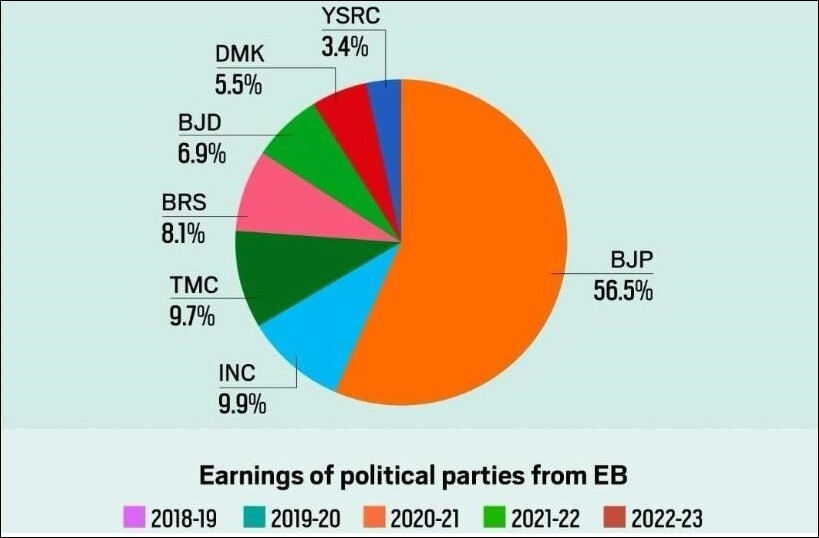
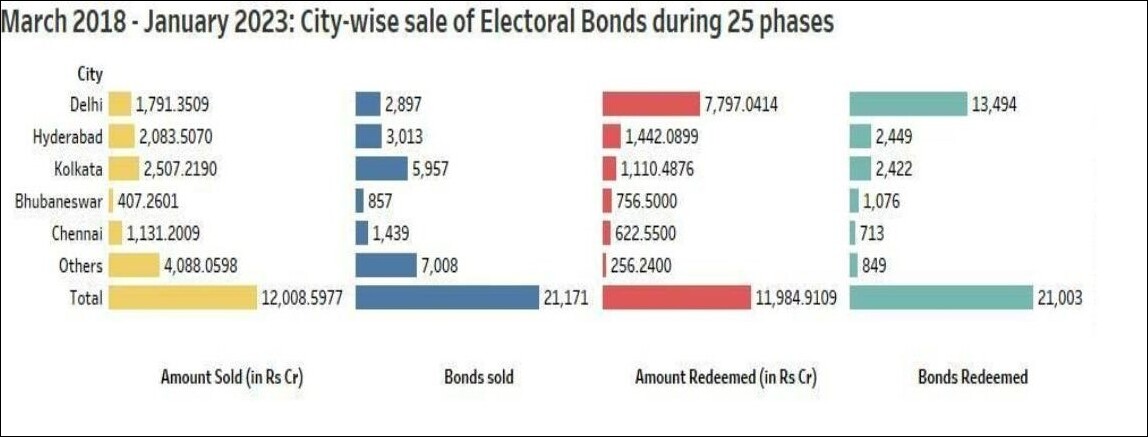
Arguments in favor of electoral bonds:
- Solicitor General Tushar Mehta argued that the focus of the scheme is not to ensure “anonymity”, but to ensure “confidentiality”.
- Referring to the apex court’s decision in 2019 to recognise the right to privacy as a fundamental right, he argued that donors have a right to privacy unless the information is a source of genuine public interest, in which case people can approach the court.
- Citizens do not have a general right to know regarding the funding of political parties. Right to know is not a general right available to citizens.
Directions issued by the Supreme Court:
1. The SBI has been ordered to immediately stop the issuance of any further electoral bonds and furnish details of such bonds purchased by political parties since April 12, 2019, to the ECI by March 6. Such details must include the date of purchase of each bond, the name of the purchaser of the bond and the denomination of the bond purchased.
2. The ECI shall subsequently publish all such information shared by the SBI on its official website by 13 March 2024.
3. Electoral bonds that are within the validity period of fifteen days but have not yet been encashed by the political party will have to be returned following which the issuing bank will refund the amount to the purchaser’s account.
4. The Supreme Court has restored the status quo that existed before the Finance Act, 2017 was passed, in all of these statutes.
Honorable Supreme Court’s Observations in the case:-
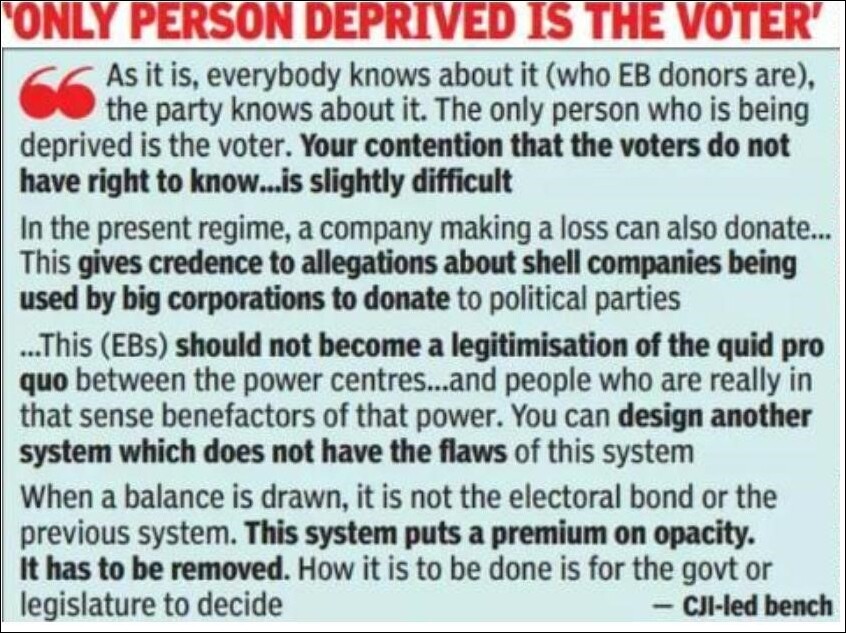
1. Importance of Transparency in Political Funding: The Supreme Court observed that, “Information about funding of political parties is essential for the effective exercise of the choice of voting.”
2. Influence of Contributions on Access and Policy: The Court noted, “At a primary level, political contributions give a seat at the table to contributors, i.e., it enhances access to legislators. This access also translates into influence over policymaking.”
It was further highlighted, “There is also a legitimate possibility that financial contributions to a political party would lead to quid pro quo arrangements because of the close nexus between money and politics. Quid pro quo arrangements could be in the form of introducing a policy change or granting a license to the person making financial contributions to the party in power.”
3. Alternatives to Electoral Bonds: The Court pointed out, “The Electoral Bonds scheme is not the only means for curbing black money in electoral financing. There are other alternatives which substantially fulfill the purpose and impact the right to information minimally when compared to the impact of electoral bonds on the right to information.”
4. On the issue of transparency, the Court stated, “The deletion of the mandate of disclosing the particulars of contributions violates the right to information of the voter since they would not possess information about the political party to which the contribution was made, which is necessary to identify corruption and quid pro quo transactions in governance—information which is necessary to exercise an informed vote.”
5. Corporate Influence in Politics: Regarding the influence of corporate contributions, the Court observed, “The ability of a company to influence the electoral process through political contributions is much higher when compared to that of an individual.”
What is Political Funding?
- Political Funding implies the methods that political parties use to raise funds to finance their campaign and routine activities.
- A political party needs money to pitch itself, its objectives, its intended actions to get votes for itself.
Data on Election Expense:
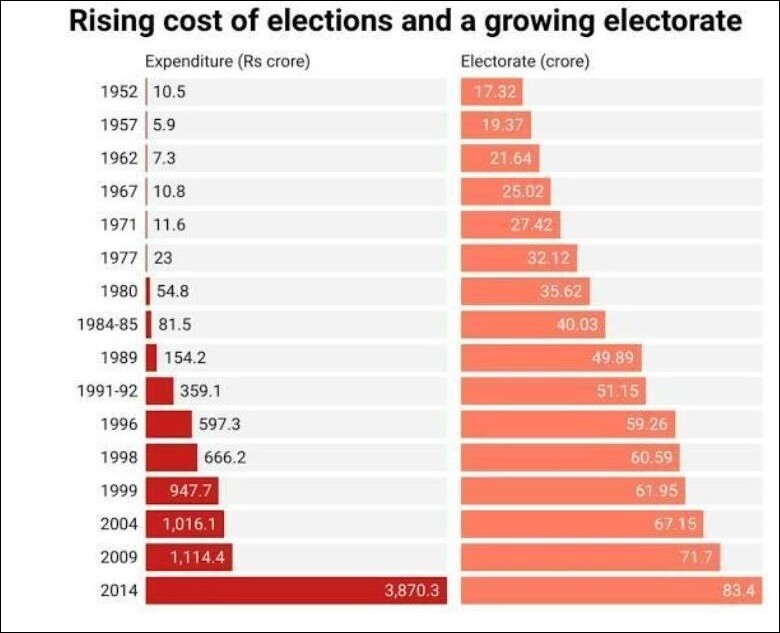
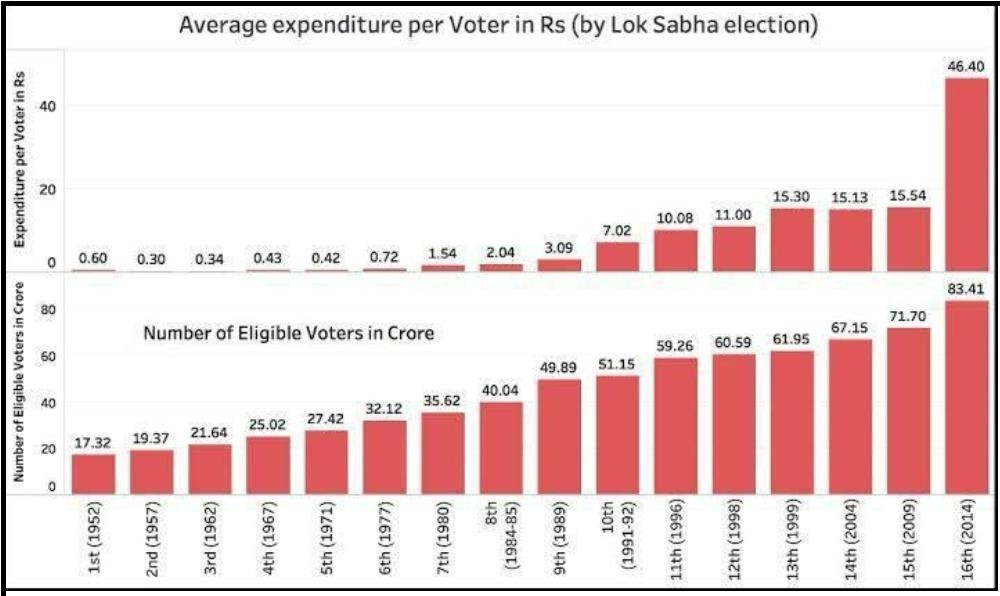
Statutory Provisions:
- Section 29B of the Representation of the People Act (RPA) entitles parties to accept voluntary contributions by any person or company, except a Government Company
- Section 29C of the RPA mandates political parties to declare donations that exceed 20,000 rupees. Such a declaration is made by making a report and submitting the same to the EC. Failure to do so on time disentitles a party from tax relief under the Income Tax Act, 1961.
Methods that Indian Political Parties use to raise the funds:
- Individual Persons: Section 29B of RPA allows political parties to receive donations from individual persons.
- State/Public Funding: Here, the government provides funds to parties for election related purposes. State Funding is of two types:
- Direct Funding: The government provides funds directly to the political parties. Direct funding by tax is prohibited in India.
- Indirect Funding: It includes other methods except direct funding, like free access to media, free access to public places for rallies, free or subsidized transport facilities. It is allowed in India in a regulated manner.
- Corporate Funding: In India, donations by corporate bodies are governed under the Companies Act, 2013. Section 182 of the Act provides that:
- A company needs to be at least three years old to be able to donate to a political party.
- Companies can donate up to 7.5% of average net profits made during three simultaneous preceding financial years.
- Such contributions must be disclosed in the company’s profit and loss account.
- Approval of the Board of Directors needs to be obtained for the contribution.
- If a company violates said provisions, it may have to pay a fine up to 5 times the amount contributed and every officer of the company who is in default shall be punishable with imprisonment for a term which may extend to six months.
- Undeclared individuals and companies bought such bonds worth 165.18 billion rupees ($1.99bn) up to November 2023, according to the Association for Democratic Reforms (ADR), a non-government transparency watchdog working on election funding in India.
A few government reports have looked at state funding of elections in the past, including:
- Indrajit Gupta Committee on State Funding of Elections (1998)
- Law Commission Report on Reform of the Electoral Laws (1999)
- National Commission to Review the Working of the Constitution (2001)
- Second Administrative Reforms Commission (2008)
Various Committee Recommendations:
The Indrajit Gupta Committee (1998):
- It endorsed state funding of elections, seeing “full justification constitutional, legal as well as on grounds of public interest” in order to establish a fair playing field for parties with less money.
- The Committee recommended two limitations to state funding. Firstly, that state funds should be given only to national and state parties allotted a symbol and not to independent candidates.
- Secondly, that in the short-term state funding should only be given in kind, in the form of certain facilities to the recognised political parties and their candidates.
The 1999 Law Commission of India report:
- It concluded that total state funding of elections is “desirable” so long as political parties are prohibited from taking funds from other sources.
- The Commission concurred with the Indrajit Gupta Committee that only partial state funding was possible given the economic conditions of the country at that time.
Second Administrative Reforms Commission’s report “Ethics in Governance” (2008):
- It recommended partial state funding of elections for the purpose of reducing “illegitimate and unnecessary funding” of elections expenses.
The National Commission to Review the Working of the Constitution, (2001):
- It did not endorse state funding of elections but concurred with the 1999 Law Commission report that the appropriate framework for regulation of political parties would need to be implemented before state funding is considered.
Dinesh Goswami Committee:
The Dinesh Goswami Committee was formed in 1990 to study the feasibility of state funding for elections.
The committee recommended the following:
- It recommended that the government should provide funding for parliamentary elections to ensure that the electoral process is fair and transparent.
- The committee suggested that the funds could be used to provide equal opportunities to all political parties and candidates, reduce the influence of money power in elections, and promote clean and honest election campaigns.
- The committee proposed that political parties and candidates should be given a fixed amount of money to conduct their election campaigns.
- The funds would be provided by the government and distributed through the Election Commission of India.
- The committee recommended that the funds should be used to cover all electionrelated expenses such as publicity, travel, and campaign materials.
- The aim of providing governmental funding for parliamentary elections is to level the playing field for all political parties and candidates, reduce the influence of money power in politics, and ensure that the electoral process is fair and transparent.
SY Quereshi committee:
- Mr. Quraishi said making sure that the donations happen through the banking system was fine but "our contention was why should a donation given to a political party be kept a secret?"
- "The donor wants secrecy but the public wants transparency. Now why should the donor want secrecy? Because they want to hide the quid pro quo, the benefits they are getting in return, the license, the contracts and even the bank loans with which they run away to the foreign lands. Is that why they wanted secrecy?
- Qureshi said that the model of funding of elections in India should be changed to public funding of political parties.
TS Krishnamoorthy:
- Former Chief Election Commissioner of India (CEC) TS Krishnamoorthy has suggested a “National Election Fund” as an alternative.
Best Practices around the world:
United States of America:
In the United States, the world’s largest democracy, "big money" contributions were banned in the first legislation passed vis-à-vis restrictions on campaign finance i.e. the Tillman Act of 1907.
In order to stem the growing influence of large donations, the Act made it illegal for corporations and national banks to make financial contributions to candidates running for public office.
The Bipartisan Campaign Reforms Act, 2002 has laid down strict guidelines to curb soft money, role of interest groups and political action committees as well as regulations to prevent the abuse of "issue advocacy".
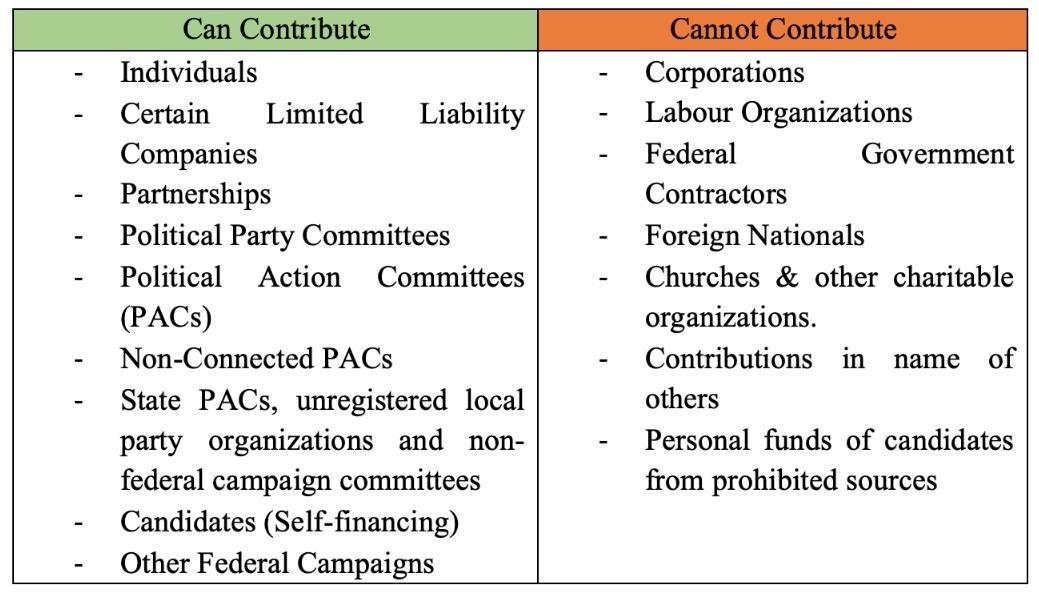
United Kingdom:
Government has issued certain guidelines for permissible donors. These include an individual registered on an electoral register, a registered political party, a registered company, a registered trade union, a registered building society or an U.K. based unincorporated association. All these provisions ensure that the influence of "big money" from registered legal entities is curtailed.
France:
With the formation of the French Republic, the electoral funding architecture had a distinctly laissez-faire approach. Business houses are prohibited from donations including corporations and other legal entities. Due to introduction of state funding, subsidies, strict disclosure legislations, robust reporting of the donations to political parties by the media and the ban on corporate donations, they are perceived to be more honest and disciplined by the general public.
Germany:
Reliance on state funding alienated the masses from the political parties who felt no need to connect with the majority of the population. In 1994, a Constitutional Court held that over-reliance on state funding is not an effective tool.
The success of political funding models hinges on combining public funding with stringent transparency and limits on donations. Public funding reduces reliance on private sources, while transparency ensures accountability. Caps on contributions and bans on corporate and union donations prevent undue influence, fostering a fair and trusted electoral system.
Further Reading: Read our detailed guide on Election Funding.
Some Prelims Previous Years Questions
Q1. Consider the following statements: (2023)
1. If the election of the President of India is declared void by the Supreme Court of India, all acts done by him/her in the performance of duties of his/her office of President before the date of decision become invalid.
2. Elections for the post of the President of India can be postponed on the ground that some Legislative Assemblies have been dissolved and elections are yet to take place.
3. When a Bill is presented to the President of India, the Constitution prescribes time limits within which he/she has to declare his/her assent.
How many of the above statements are correct?
(a) Only one
(b) Only two
(c) All three
(d) None
Q2. Consider the following statements in respect of election to the President of India. (2023)
1. The members nominated to either House of the Parliament or the Legislative Assemblies of States are also eligible to be included in the Electoral College.
2. Higher the number of elective Assembly seats, higher is the value of vote of each MLA of that State
3. The value of vote of each MLA of Madhya Pradesh is greater than that of Kerala.
4. The value of vote of each MLA of Puducherry is higher than that of Arunachal Pradesh because the ratio of total population to total number of elective seats in Puducherry is greater as compared to Arunachal Pradesh.
How many of the above statements are correct?
(a) Only one
(b) Only two
(c) Only three
(d) All four
Q3. Consider the following statements: (2020))
1. According to the Constitution of India, a person who is eligible to vote can be made a minister in a State for six months even if he/she is not a member of the Legislature of that State.
2. According to the Representation of People Act, 1951, a person convicted of a criminal offense and sentenced to imprisonment for five years is permanently disqualified from contesting an election even after his release from prison.
Which of the statements given above is/are correct?
(a) 1 only
(b) 2 only
(c) Both 1 and 2
(d) Neither 1 nor 2
Q4. With reference to the Constitution of India, prohibitions or limitations or provisions contained in ordinary laws cannot act as prohibitions or limitations on the constitutional powers under Article 142. It could mean which one of the following? (2019)
(a) The decisions taken by the. Election Commission of India while discharging its duties cannot be challenged in any court of law.
(b) The Supreme Court of India is not constrained in the exercise of its powers by the laws made by Parliament.
(c) In the event of a grave financial crisis in the country, the President of India can declare a Financial Emergency without the counsel from the Cabinet.
(d) State Legislatures cannot make laws on certain matters without the concurrence of the Union Legislature.
Some Mains Previous Years Questions
Q1. Discuss the procedures to decide the disputes arising out of the election of a Member of the Parliament or State Legislature under The Representation of the People Act, 1951. What are the grounds on which the election of any returned candidate may be declared void? (2022)
Q2. Discuss the role of the Election Commission of India in the light of the evolution of the Model Code of Conduct. (2022)
Q3. “There is a need for simplification of procedure for disqualification of persons found guilty of corrupt practices under the Representation of Peoples Act”. Comment. (2020)
Q4. On what grounds a people’s representative can be disqualified under the Representation of People Act, 1951? Also mention the remedies available to such person against his disqualification. (2019)
Q5. In the light of recent controversy regarding the use of Electronic Voting Machines (EVM), what are the challenges before the Election Commission of India to ensure the trustworthiness of elections in India? (2018)
Q6. ‘Simultaneous election to the Lok Sabha and the State Assemblies will limit the amount of time and money spent in electioneering but it will reduce the government’s accountability to the people’ Discuss. (2017)
Q7. To enhance the quality of democracy in India the Election Commission of India has proposed electoral reforms in 2016. What are the suggested reforms and how far are they significant to make democracy successful? (2017)
Q8. The Indian party system is passing through a phase of transition which looks to be full of contradictions and paradoxes.” Discuss. (2016)
SOME QUESTIONS FROM THIS YEAR’S INTERVIEW TRANSCRIPTS
Board: Choubey sir (2023)
- What is electoral bond? what is the controversy around it? What are your views?
- Wont making donor’s list public reduce their incentive to donate?
- Wont it lead to witch hunting by parties against donors of rival parties?
Board: Raj Shukla Sir (2023)
- What is the situation of democracy in Pakistan?
- In your opinion in which year Pakistan had conducted a fair election.
- America, a proponent of democracy, is also facing issues in this regard. What is your stand?
- Why is there a new trend in the world in terms of democracy and elections?
Board BB Siwan Sir (2023)
- Your opinion regarding the act of returning officer?
- What is transparency, accountability, and integrity?
Board Dinesh Dasa Sir (2023)
- State funding of elections. Should we go for it?
- Internal elections in political parties.
Board Dinesh Dasa Sir (2023)
- One nation, one election, advantages and disadvantages?
- What is the problem with conducting elections every 2.5 years?
- Do you think the present system of appointment of Election Commission is right? Should we replace it with the collegium system?
Board Raj Shukla Sir (2023)
- Many countries are going for elections this year. Can you name some countries where elections took place?
- Linked elections in Bangladesh, Taiwan and Pakistan with democracy.
- What about democratic status of the US as Trump is most likely to return as President and that capitol hill incident.
QUICK LINKS